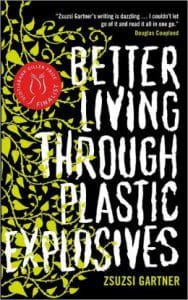 Zsuzsi Gartner’s new story collection, Better Living Through Plastic Explosives (Pintail, 224 pages), is a fun book in the best sense: a treasure of tears, laughs, sighs, and smiles.
Zsuzsi Gartner’s new story collection, Better Living Through Plastic Explosives (Pintail, 224 pages), is a fun book in the best sense: a treasure of tears, laughs, sighs, and smiles.
From her opening story, “Summer of the Flesh Eater,” to the title story that closes the collection, Gartner takes us on a creative and bizzare ride in and around British Columbia, awakening us to the marvels of the ordinary. Houses are swallowed up by the earth, recovering terrorists sweat over backyard gardens, a couple speaks the language of Swedish furniture, angels go to high school, and a group of adopted Chinese daughters disappear on a wintry night.
The titles hint at how entertaining each piece is, and the imaginative, compelling scenarios contained in them. “Investment Results May Vary” follows a character hobbling around Vancouver in a marmot suit; “Mister Kakami” offers a handful of frightening visions, which include nuns turning, “blue-grey and waterlogged,” and there’s the self-explanatory “Someone Is Killing the Great Motivational Speakers of Amerika.” Gartner isn’t afraid of the ridiculous and the absurd, beautifully using these very elements to highlight the wonder and the depth, in the ordinary. Gartner’s stories glow with the strange, sometimes eerily, sometimes splendidly, but always as an exclamation point to the fundamental truths that we see everyday.
Every person wants something in these stories, and Gartner explores the journeys, glorious and ugly, some take to fulfill their desires—and when they fail, she shows how they respond. “It’s about the things you want,” one story reads, “Don’t let anyone tell you differently. It’s about the things you can’t have. Is it so terrible to want what you can’t have?” In “Mister Kakami,” Kakami asks himself, while dwelling on his career, “How had he ended up making films and not movies, when it was good old-fashioned flicks, middlebrow and sentimental, excluding only those who didn’t believe in magic, that he so loved?”
Gartner’s whimsical stories cut to the core of the human condition. Even angels, who spend a few months inhabiting the bodies of high school kids in “We Come in Peace,” sift through the complexities of mundane life and think, “How mystifying it is that knowledge and experience are such utterly different beasts—one a contemplating buffalo, the other a wild mink.”
Better Living Through Plastic Explosives, which was shortlisted for the 2011 Giller Prize, is about individuals, communities, their futures, and their pasts. Gartner makes us think about what it means to be a person—imperfect, full of failures and desires.
